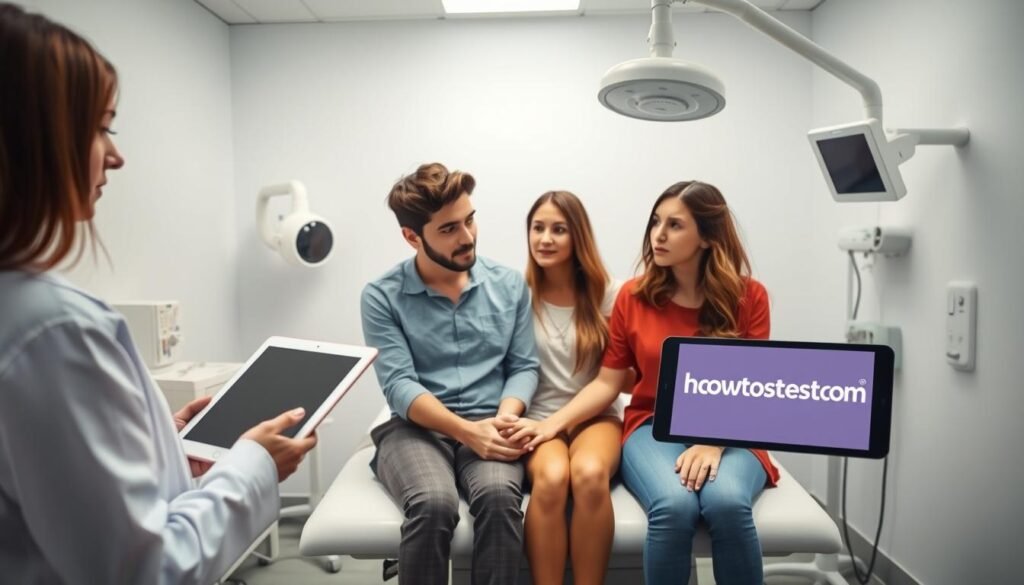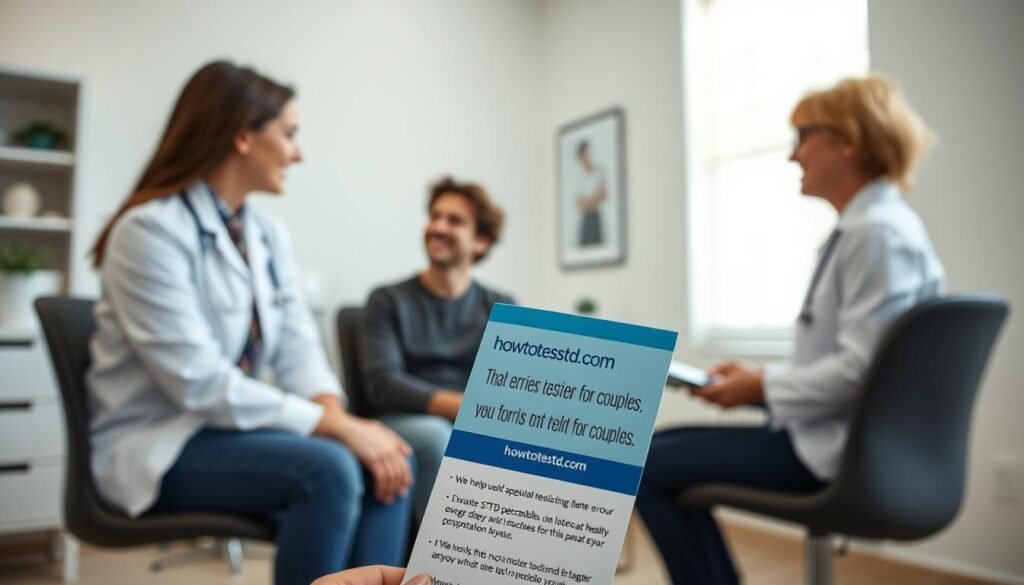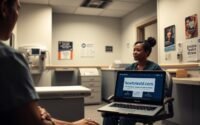STD Testing for Couples: Prioritize Your Health
Nearly 1 in 5 adults in the United States has an STI. Many don’t show symptoms. This shows why it’s key to take care of your health, even more so for couples.
Getting tested for STDs regularly is very important. It helps keep you and your partner healthy. Testing together shows you care about each other’s well-being.
It’s important to take care of your health early. Don’t wait to get tested. Prioritizing your health makes your relationship stronger and more trusting.
Key Takeaways
- Regular STD testing is essential for maintaining sexual health.
- Couples should get tested together to ensure mutual health.
- Proactive health measures strengthen relationships.
- Many STIs are asymptomatic, making testing critical.
- Prioritizing health fosters trust and wellness.
The Importance of Proactive Sexual Health
It’s important to take care of your sexual health. This means getting tested often, talking openly, and understanding each other. It makes your relationship stronger and more honest.
STDs can hide without any signs. This makes it very important to test regularly. Don’t wait to get tested.
Protecting Both Partners’ Well-being
Testing for STDs together is key. It lets both partners know their health status. This knowledge helps you both stay safe and make smart choices about your health.
Building Trust and Transparency in Relationships
Talking about and getting couples STD test builds trust. It shows you care about each other’s health. Being open about your health can make your bond stronger.
Preventing Long-term Health Complications
Untreated STDs can cause big health problems later. Regular STD screening for couples finds these issues early. This means you can treat them quickly and avoid big problems.
Being proactive about your sexual health has many benefits:
- Early detection and treatment of STDs
- Enhanced trust and communication in the relationship
- Prevention of long-term health complications
- A healthier and more fulfilling sexual relationship
When Should Couples Get Tested for STDs?
Deciding to get tested for STDs is a big step for couples. It’s important at certain times. Early testing stops the spread of diseases and helps care for each other’s health.
At the Beginning of a New Relationship
Testing at the start of a new relationship shows care and trust. It’s a thoughtful act. STD testing for partners finds health issues early.
After Previous Relationships or Possible Exposure
If you’ve been in past relationships or might have been exposed, test. This is key if you’ve had unprotected sex or if past partners weren’t tested. Getting tested for STDs as a couple in these cases gives peace of mind.
When Considering Unprotected Sex or Family Planning
Before unprotected sex or planning a family, test. Unprotected sex raises STD risk. Knowing your health status is vital before these big steps.
Signs That Indicate Testing Is Needed
Look out for signs like unusual discharge, pain when you pee, or rashes. These could mean an STD. If you see these, test right away. Early detection is key to treating and avoiding health problems.
Common STDs That Couples Should Test For
Knowing about common STDs is key for couples to stay healthy. It’s important to take care of your health, including sexual health. Testing for STDs helps couples make smart choices about their health.
Bacterial Infections
Bacterial infections are a big worry for couples. Chlamydia, gonorrhea, and syphilis are common ones. If not treated, they can cause serious health problems.
Chlamydia, Gonorrhea, and Syphilis
Chlamydia might not show symptoms but can harm women’s fertility. Gonorrhea can hurt both men and women. Syphilis can get worse if not treated, leading to serious health issues.
Testing Methods and Detection Windows
Tests for these infections include urine tests or swabs. Chlamydia and gonorrhea tests work a few days after exposure. Syphilis tests need more time because antibodies take longer to form.
Viral Infections
Viral infections like HIV, herpes, HPV, and hepatitis are also big worries. These viruses can affect you for life and need special care.
HIV, Herpes, HPV, and Hepatitis
HIV weakens the immune system. Herpes causes outbreaks. HPV can cause cancers, and hepatitis harms the liver. Knowing about these viruses is important for managing them.
Testing Methods and Detection Windows
Testing for viral infections is different. HIV tests are blood tests that can show results in a few weeks. Herpes and HPV tests use swabs or blood, with different detection times. Hepatitis tests are blood tests.
Other Common STDs
Other STDs like trichomoniasis and pubic lice are also important. They need special tests and treatments.
For couples, getting tested is a smart move for a healthier relationship. Knowing about STDs and how to test for them helps couples make good health choices.
STD Testing for Couples: Options and Procedures
There are many ways for couples to get STD tested. They can pick from clinical tests, at-home kits, or free/low-cost services. It all depends on what they need and want.
Clinical Testing Options
Clinical testing is a detailed and safe way to test for STDs. It means going to a doctor or a special clinic.
Primary Care Providers and OB/GYN Services
Doctors and OB/GYNs can test for STDs. They also talk about health and give advice on sex. They offer personal care and answer questions.
Specialized STD Clinics
STD clinics focus on sex health and testing. They keep things private and might give quick results.
At-Home Testing Kits
At-home kits are easy and private. You can take a sample at home and send it to a lab.
Reliability and Accuracy Considerations
At-home kits are handy but not always perfect. Make sure to pick ones from trusted sources for accurate results.
Popular At-Home Testing Services
Everlywell and STD Testing Service offer at-home tests. They give clear instructions and fast results.
Free and Low-Cost Testing Resources
For those without insurance or on a tight budget, there are affordable tests. Community clinics and non-profits offer these services.
Don’t delay getting tested. With so many options, couples can protect their health and bond through honesty and care.
How to Approach the STD Testing Conversation
Talking about STD testing can be tough. But seeing it as a team effort makes it easier. It’s key to keep your health in check, and talking about STD testing is a big part of that.
Starting the Discussion Respectfully
When you start talking about STD testing, be kind and think about how your partner feels. Pick a quiet spot where you both feel safe and won’t be bothered. Say you care about each other’s health and don’t blame or assume anything. Say things like “I feel it’s important we get tested together.”
Addressing Concerns and Hesitations
Your partner might have doubts or worries about STD testing. Listen to them and try to make them feel better. Talk about how STD testing together can make you both trust each other more. If money is a worry, tell them about free and low-cost testing resources.
Framing Testing as an Act of Care
Seeing STD testing as a way to show you care can make things easier. Say it shows you both care about each other and want a healthy relationship. Explain that STD screening for couples is good for both of you and can make your bond stronger.
Handling Possible Resistance
If your partner doesn’t want to get tested, don’t push them. Talk openly about their fears and why they think it’s important for both of you to get checked. Sometimes, people are scared or don’t know the facts. Gently talking about these can help calm their fears.
| Tips for Approaching STD Testing Conversation | Benefits |
|---|---|
| Choose a comfortable and private setting | Reduces anxiety and promotes openness |
| Use “I” statements to express feelings | Prevents blame and defensiveness |
| Highlight the benefits of mutual testing | Builds trust and ensures mutual understanding |
What to Expect During Couples STD Testing
When couples get tested for STDs together, knowing the process helps. It makes the experience less scary and easier to understand.
Testing Procedures for Different STDs
The tests for STDs can vary. They usually include blood tests, urine tests, and swabs. Each test checks for different infections.
Blood Tests and Their Purpose
Blood tests find infections like HIV, syphilis, and hepatitis. A healthcare worker takes a blood sample. Then, the sample is checked in a lab.
Urine Tests and Swabs
Urine tests look for chlamydia and gonorrhea. Swabs collect samples from the body. They check the genital area, throat, or rectum.
Physical Examinations
A physical exam checks for STD signs. This includes looking for genital warts or sores. It’s a key part of the test.

Privacy and Confidentiality Considerations
STD testing is very private and confidential. Healthcare providers follow strict rules to keep your info safe.
Insurance Coverage and Costs
Many insurance plans cover STD testing. Check with your insurance to see what’s covered. If you don’t have insurance, there are free or low-cost options.
Don’t delay getting tested. Knowing about costs and coverage helps plan for the test.
Understanding and Responding to Test Results
It’s very important to understand STD test results. This is key for both partners’ health. Getting test results can be a big moment for couples. It’s important to be proactive about your health.
Interpreting Negative Results
A negative test result is good news for couples. It means no STDs were found at the time. But, it’s important to remember that a negative result doesn’t mean you’re completely safe.
Recent exposure to an STD might not show up right away. So, it’s key to keep practicing safe sex and get tested often. This is true, even if your relationship changes.
Handling Positive Results Together
If the test shows a positive result, couples should face it together. A positive result doesn’t mean everything is over. Many STDs can be treated.
The first thing is to stay calm and not worry too much. Talk to your healthcare provider to learn about your diagnosis and treatment. For more info on testing, visit this resource.
Treatment Options and Next Steps
Treatment for STDs depends on the type. Bacterial infections like chlamydia and gonorrhea can be treated with antibiotics. Viral infections, like HIV, need different treatments, like antiviral meds and lifestyle changes.
Couples should talk to their healthcare provider to find the best treatment. This is important for both partners.
Emotional Support and Communication
Emotional support and talking openly are key, no matter the test results. Couples should share their feelings and any worries. Being empathetic and understanding can make your relationship stronger. It helps you face any challenges together.
Myths and Misconceptions About Couples STD Testing
Many people don’t know the truth about STD testing for couples. This can make them feel scared or unsure. But, getting tested is easy and very important for keeping your relationship healthy and strong.
Common Testing Myths Debunked
Some think STD tests are only for people with many partners. But, anyone starting a new relationship or thinking about not using protection should get tested. Also, many people think STD tests hurt or are hard to do. But, most tests are simple and don’t hurt.
Others think they don’t need to get tested if they’ve been together for a long time. But, even in long-term relationships, STDs can spread. This can happen if one person was infected before you started dating or if there was a past exposure.
Addressing Stigma and Shame
STDs can make it hard for couples to talk about getting tested. But, it’s very important to be open and understanding. Getting tested shows you care about each other’s health.
Seeing STD testing as part of regular health care is key. This way, couples can stay healthy and build a stronger bond together.

Conclusion
Regular STD testing is key for couples’ health. It’s important to be proactive about your health. Don’t wait to get tested.
STD testing helps protect both partners. It builds trust and prevents health problems later. It’s a smart and caring choice.
Don’t wait to take care of your health. There are many ways to get tested, like at clinics or at home. Make sure to test regularly to keep your relationship healthy.
FAQ
Why is STD testing important for couples?
STD testing is key for couples. It keeps both partners healthy and builds trust. Many STDs don’t show symptoms, so regular tests are vital.
When should couples get tested for STDs?
Couples should test at the start of a new relationship. They should also test after previous relationships or if they’ve been exposed. Testing is needed before unprotected sex or when planning a family. If symptoms appear, get tested right away.
What STDs should couples get tested for?
Couples should test for chlamydia, gonorrhea, HIV, herpes, syphilis, and hepatitis. The tests needed depend on the situation and risk factors.
What are the options for STD testing for couples?
Couples can choose clinical testing, at-home kits, or free/low-cost options. Clinical testing offers full care, while at-home kits are private and easy.
How can couples approach the conversation about STD testing?
Start the talk with respect and care. Be open to each other’s feelings. Work together to find the best way to test.
What can couples expect during the STD testing process?
Expect different tests for different STDs. Know about privacy and costs. Understand insurance and what it covers.
How should couples understand and respond to their STD test results?
Know what negative and positive results mean. Learn about treatments and next steps if you have an STD. Support each other emotionally and talk openly.
What are some common myths about STD testing for couples?
Some think testing is only for high-risk people or shows mistrust. But, it’s key for a healthy relationship and protecting both partners.
How can couples overcome the stigma associated with STD testing?
Learn about STDs and testing. Talk openly and with empathy. Focus on the benefits of testing, like trust and health.
Is couple STD testing covered by insurance?
Coverage varies by provider and policy. Check with your insurance to see what’s covered and what you might pay out-of-pocket.
Can couples get tested together at the same clinic?
Yes, many clinics offer joint testing. This is a convenient way for both partners to test together and get support.


